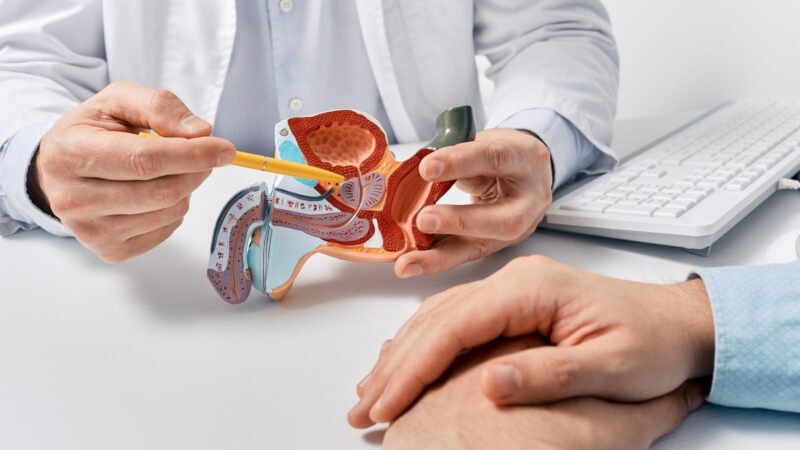Turning 40 is often considered a milestone in a man’s life. Beyond career achievements and family responsibilities, this decade also marks an important shift in health.
Subtle but significant physiological changes begin to occur — metabolism slows, hormone levels decline, and the risk of cardiovascular disease, prostate enlargement, and diabetes increases.
By understanding these changes and addressing them proactively, men can maintain vitality, strength, and long-term quality of life.
Why Preventive Health Matters After 40

Many of the most serious men’s health conditions develop silently over years. High blood pressure, cholesterol, and even early-stage cancers often present no obvious symptoms until complications arise.
That’s why preventive screening and lifestyle changes are critical after 40.
- Cardiovascular health: Heart disease remains the leading cause of death in men over 40. Monitoring blood pressure, cholesterol, and weight can prevent heart attack and stroke.
- Urological health: Prostate enlargement (benign prostatic hyperplasia, or BPH) often begins in the 40s, leading to symptoms such as frequent urination, weak stream, or difficulty emptying the bladder. Blood in urine, erectile dysfunction, or testicular changes also require evaluation. Seeing a urologist in Singapore ensures early detection of prostate conditions, urinary tract issues, and male reproductive disorders.
- Metabolic health: Insulin resistance and type 2 diabetes become more common in midlife. Regular glucose testing helps catch issues before permanent damage occurs.
- Hormonal changes: Testosterone naturally declines about 1% per year after age 40. While not always problematic, low levels can cause fatigue, mood changes, reduced libido, and loss of muscle mass.
- Cancer risk: The chances of developing prostate, colorectal, and skin cancers increase with age. Early detection significantly improves treatment outcomes.
When to See a GP and When to See a Specialist
Your GP is usually the first point of contact for routine checkups, blood tests, and common concerns like mild urinary changes, fatigue, or elevated blood pressure. However, certain symptoms require specialist evaluation:
- Urologist: For blood in urine, persistent erectile dysfunction, testicular lumps, or recurrent urinary tract infections.
- Cardiologist: For chest pain, unexplained shortness of breath, or strong family history of heart disease.
- Endocrinologist: For unexplained weight changes, low energy despite lifestyle improvements, or suspected hormonal imbalance.
Specialists undergo years of training and have access to diagnostic tools beyond general practice, such as cardiac stress testing, cystoscopy, or advanced hormonal profiling.
Essential Screenings for Men Over 40

- Blood pressure and cholesterol: Annually, or more often if elevated.
- Blood glucose / HbA1c: Every 1–3 years, especially if overweight.
- Prostate cancer: PSA blood test and digital rectal exam beginning at 50, or at 45 for men with family history.
- Colorectal cancer: Colonoscopy starting at 45, then at intervals depending on findings.
- Skin cancer: Regular self-checks and dermatologist evaluations for suspicious moles.
- Vision and hearing: Baseline assessment around 40, then repeat every few years.
These evaluations build a preventive framework that can identify disease early, when interventions are most effective.
Lifestyle Habits That Protect Health After 40
Nutrition
A balanced diet helps counter slowing metabolism and supports heart, bone, and hormonal health. Focus on:
- Lean proteins for muscle maintenance
- Whole grains for sustained energy
- Vegetables and fruits for antioxidants
- Omega-3 fats from fish or flaxseed for cardiovascular protection
Limit alcohol, added sugars, and highly processed foods that increase inflammation and weight gain.
Exercise
Physical activity maintains cardiovascular fitness, joint mobility, and testosterone levels. Aim for:
- 150 minutes of moderate aerobic activity weekly (e.g., brisk walking, cycling, swimming)
- Strength training twice a week to prevent muscle loss and maintain metabolism
- Flexibility and balance exercises such as yoga or tai chi to reduce injury risk
Weight Management
Excess abdominal fat is strongly linked to diabetes, hypertension, and cardiovascular disease. Waist circumference greater than 40 inches (102 cm) signals higher metabolic risk.
Male-Specific Concerns After 40
Prostate Health

Prostate enlargement (BPH) often begins in the 40s and can cause frequent urination, weak stream, or incomplete bladder emptying. While a GP can provide initial assessment, a urologist may use PSA testing, digital rectal exams, or prostate imaging for accurate diagnosis.
Sexual Health
Erectile dysfunction persisting beyond three months deserves medical evaluation. Causes range from low testosterone to vascular disease, which may also signal heart problems. Urologists offer Doppler ultrasound, hormone panels, and advanced treatment options beyond standard prescriptions.
Fertility Considerations
Although men remain fertile longer than women, sperm quality declines after 40. For couples facing difficulties, urologists trained in andrology can assess semen quality, hormonal status, and provide targeted treatments.
For those considering long-term family planning options, some clinics now offer a virtually painless vasectomy procedure that provides a minimally invasive and effective approach to male contraception. These advanced methods help men make informed choices about reproductive health with minimal recovery time or discomfort.
Kidney and Bladder Concerns
Kidney stones, bladder control problems, and chronic pelvic pain become more common with age. Early specialist intervention prevents emergency complications.
- Kidney stones: Severe flank pain, blood in urine, or fever warrants urologist assessment. Treatments range from shockwave therapy to minimally invasive surgery.
- Bladder issues: Overactive bladder, stress incontinence, or nocturia (waking at night to urinate) impact quality of life. Urologists can distinguish causes and offer medications, bladder training, or surgical interventions.
- Chronic pelvic pain: Persistent perineal or testicular pain requires evaluation to rule out prostatitis, nerve dysfunction, or pelvic floor issues.
Cancer Screening and Surveillance

- Prostate cancer: Screening should be individualized, but discussions typically begin at 45–50. Urologists interpret PSA trends and use multiparametric MRI or biopsies when needed.
- Colorectal cancer: Colonoscopy remains the gold standard for detecting polyps and early cancer. Early removal prevents progression.
- Bladder cancer: Risk increases with smoking, workplace exposures, and chronic bladder irritation. Cystoscopy provides direct visualization and biopsy of suspicious lesions.
- Kidney cancer: Incidental kidney masses on imaging require careful evaluation. Small tumors may be monitored, biopsied, or surgically removed.
Conclusion
Men’s health after 40 requires a comprehensive approach: routine GP visits, specialist consultations when needed, and commitment to lifestyle habits that protect the heart, hormones, and reproductive system.
By prioritizing preventive screenings, addressing symptoms early, and making sustainable lifestyle adjustments, men can preserve vitality, independence, and overall wellbeing for decades to come.

